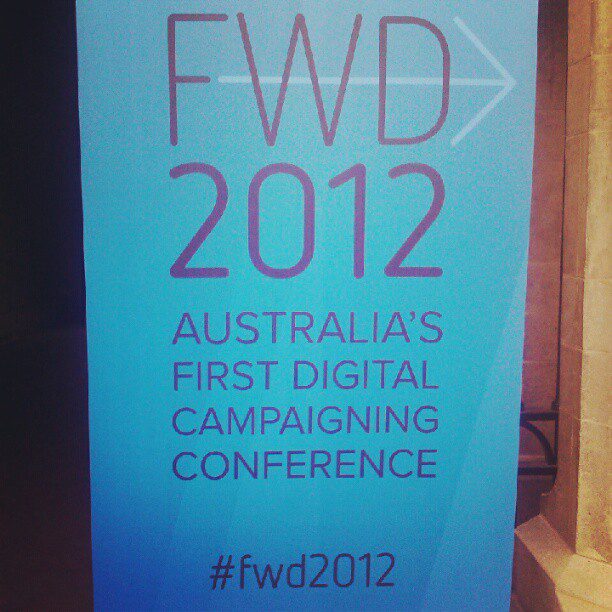
FWD2012 was Australia’s first conference just for digital campaigners. Held at Queens College in Melbourne on November 28-29, FWD2012 brought together over 170 digital campaigners from 70+ organizations to share their knowledge and experience, learn from each other and to contribute to a new community of campaigners in Australia. The conference heard from some great speakers representing many participating organizations including: AFL-CIO, GetUp, Change.org, Oxfam, Essential Media Communications, Amnesty International, Engaging Networks, Global Poverty Project, The Australian Greens, The Australian Labour Party and many others.
There was a lot of activity on the #fwd2012 hashtag, and we have archived all of these Tweets on our website.
One of the themes that the participants and speakers kept returning to was the intersection of digital campaigning and offline campaigning. What is the relationship between online and offline campaigning and how can you convert online communications to offline actions? As the lines between campaigning and digital campaigning continue to blur, one of the key issues for many people is how to make the flow between on and offline campaigning more fluid. Many different solutions were proposed and discussed during the conference, but this is still a live issue for many campaigns and it will be interesting to hear next year how campaigners have addressed this problem.
How can data gathered in offline campaigning be fed into online campaigning and how can this data be used to make offline campaigning more effective? These questions were pondered throughout the conference, but one thing everyone agreed on was what that soon there will no longer be a distinction between campaigning and digital campaigning; all effective campaigns will need to place digital at the heart of what they do. This is a difficult proposition for many organizations who have a siloed organizational structure which does not support digital campaigning. One of the big challenges for older organizations is how to better integrate digital across everything they do rather than having a separate ”digital” department.
To that end, many organizations making the move to digital think that the person who builds the websites and writes the online copy is the same person, and as David Paris pointed out during a panel discussion during FWD2012, many campaigns suffer because of that.
Good to think about this heading into an election year. Elections offer a unique opportunity to get your issue on the agenda.
This was advice from Lucy Manne, who found that when she was working as digital advisor to congresswoman Ann McLane Kuster’s election campaign this year that emails that had a small ask had a higher unsubscribe rate than emails with a low ask. Something that I have suspected for a while is that people turn off when you ask them to do something they deem to be unimportant or insignificant. The data from Lucy suggests that campaigners need to make their small asks even more compelling than their large asks; if a subscriber doesn’t see the value in your ask they will switch off.
The lesson here is to make sure that you tell a compelling story to your subscribers, tell them where they fit into your movement and how their contribution matters.
This is exactly why we decided to run FWD2012. There are so many progressive organizations in Australia doing fantastic work in the digital space, and FWD2012 was an amazing opportunity for people in the sector to make links with their peers and I can’t wait to see some of the collaborations that will no doubt result from the conference.
by James Clark, Digital Campaigns Intern with Oxfam Australia





